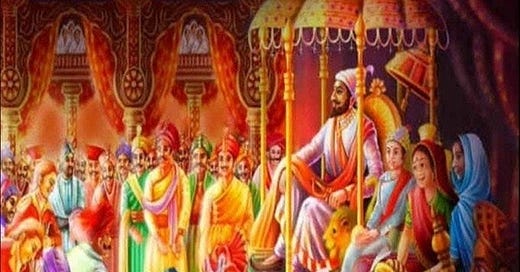While a lot is known about Shivaji Maharaj's military conquests and battles, I feel not much focus has been laid on his administration and the way he built up the military. Shivaji has rightly been regarded as one of the finest warriors, a great general, a brilliant strategist and a renowned exponent of guerrilla warfare. His role in raising a dynasty and and independent kingdom, during the reign of the Mughals, and the way he gave nightmares to Aurangzeb has been the stuff of heroism and legend.
For some one who spent the better time of his life, fighting to build and preserve his empire, and who really had not much formal education, Shivaji built in quite a robust administration and taxation system. As quoted by Rawlinson
"Like nearly all great warriors-Napoleon is a consipcuous example-Shivaji was also a great administrator, for the qualities which go to make a capable general are those which are required by the successful organiser and statesman".
Shivaji was an autocrat like any one other ruler of his time, he however ensure that he did not misuse the great power vested in him. He had a council of 8 ministers, the Ashta Pradhan who assisted and was a kind of advisory council. They comprised the following.
Peshwa- Prime Minister, who looked after the overall welfare of the people and the state.
Amatya- Finance Minister, who looked after all the public accounts of the kingdom and some districts.
Mantri or Wakia Nawis- Chronicler who kept a daily account of what was happening in the court.
Samant/Dabir- Foreign Secretary who advised the king on all matters of war and peace, and those relating to foreign states. Also receiving foreign Ambassadors and envoys.
Sachiv- Home Secretary, who handled the king's correspondence, ensuring all royal orders were in proper style.
Pandit Rao- Equivalent to Muhtasib, the religious head, whose duty was to fix dates for religios ceremonies, oversee public morals and interpret religious laws,
Nyayadish-Chief Justice reponsible for civil and military justice.
Senapati- Commander in chief, who oversaw the recruitment and organization of the Army.
Barring Nyayadish and Senapati, all the other ministers were to lead military expeditions and command armies.
Shivaji also did away with the practice of granting Jagirs to officers, and instead all were paid in cash. Even when officials had to do revenue collection, their only responsibility was collection, and beyond that they had no control over the money. The kingdom was divided into 4 provinces, and there was a Viceroy in charge of each. These provinces in turn had a number of sub divisions, called pranths.
Revenue
Shivaji did away with the existing system of taxing the farmers, through the Zamindars or Deshmukhs. The Government would deal directly with cultivators and land was surveyed using a measuring rod called the Kathi.The state's share was initially 30% of produce, though it was increased to 40% later on. The farmer could pay the amount either in cash or kind. Similiarly for territories occupied by Shivaji, outside the Maratha region, two taxes were levied, Chauth which was 1/4th of the territory's income, and Sardeshmukhi which was an additional 10% levy on the chauth, as a tribute to the ruler.
Military
Till the advent of the Shivaji, the Marathas generally had an army made of irregulars, most of them essentially farmers who fought during the dry season. It was Shivaji who came up with a regular, professional army, where the soldiers were paid in cash throughout the year. The army was constituted into units, and grades were given regularly. Each unit consisting of 25 troopers reported to a Havaldar, who in turn reported a Jumladar, and there was a chain of command, Jumladar- Hazari-Sari Naubat. The infantry was divided again into regiments, brigades, divisions, and both Hindus, Muslims were recruited without any discrimination. As forts played a vital role in the defence, they were well mantained, garrisons were selected carefully, and they had the Havaldar, Sabnis overseeing them.Women, female slaves, dancing girls were not permitted into the army, to maintain discipline of ranks. Even during military campaigns, ground rules were laid down, women, children, elderly and infirm people would not be harassed. No women of the enemy would be taken as slaves, and if captured, she would be sent back with due respect. Valuables that were taken during military raid, were strictly the property of the state treasury, and should not be used for personal benefit.
Navy
Shivaji was one of the few rulers who realized the importance of a strong Navy in protecting the Konkan coast from pirates, and also not being dependent on the English, Dutch and Portugese. Naval forts were built at Vijaydurg, Sindhudurg,Jaigad etc, while docks for repair of naval vessels were set up at Ratnagiri. He had 4 different kind of war ships-Gurabs, Gallibats,Pals and Manjuhas.And also maintained a large merchant navy for trade purposes.
Shivaji is well known for his military exploits and heroism, but not really is much known about his administration, the way he built up a professional army, his role in building a navy, so yes on those aspects he is quite underrated.




